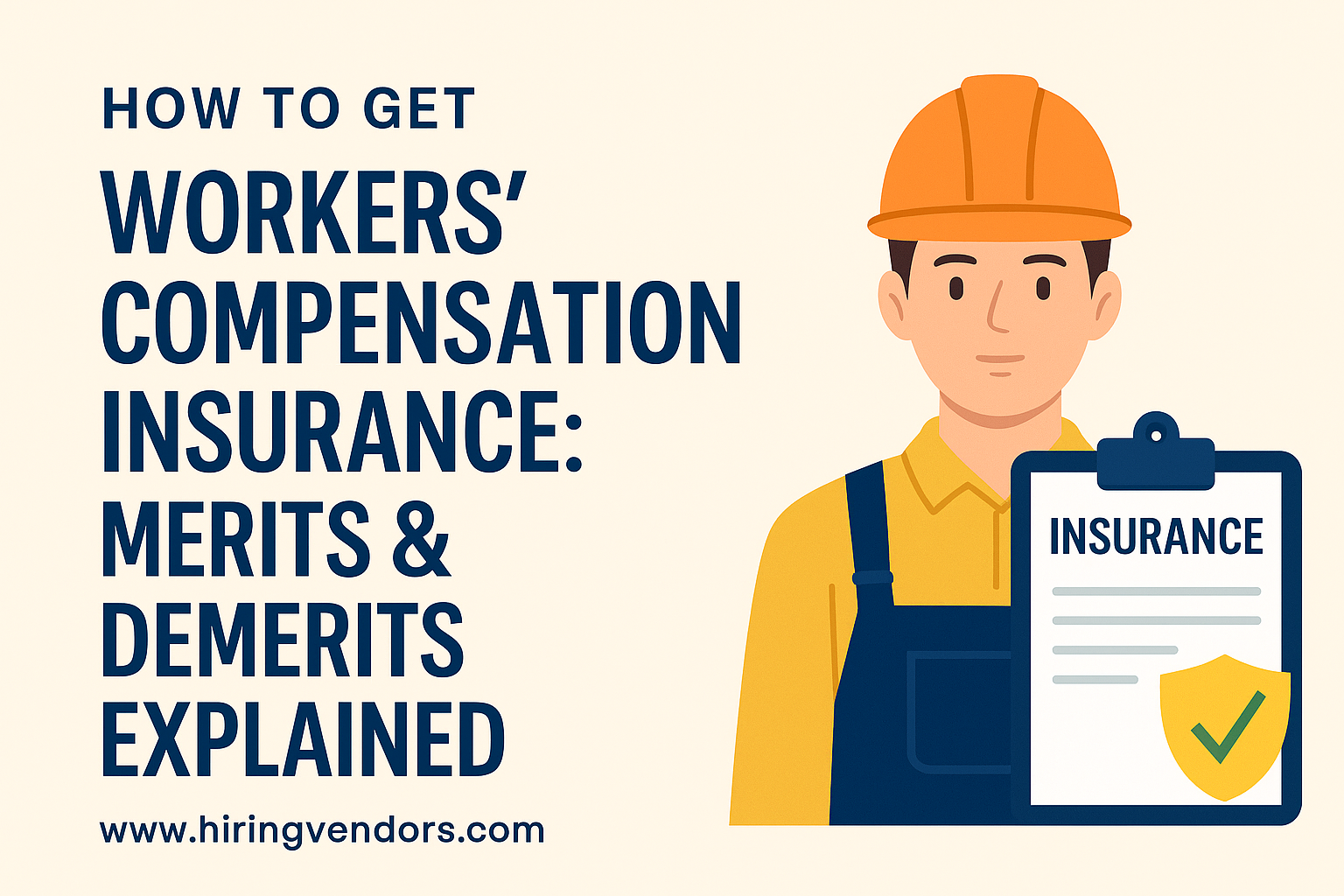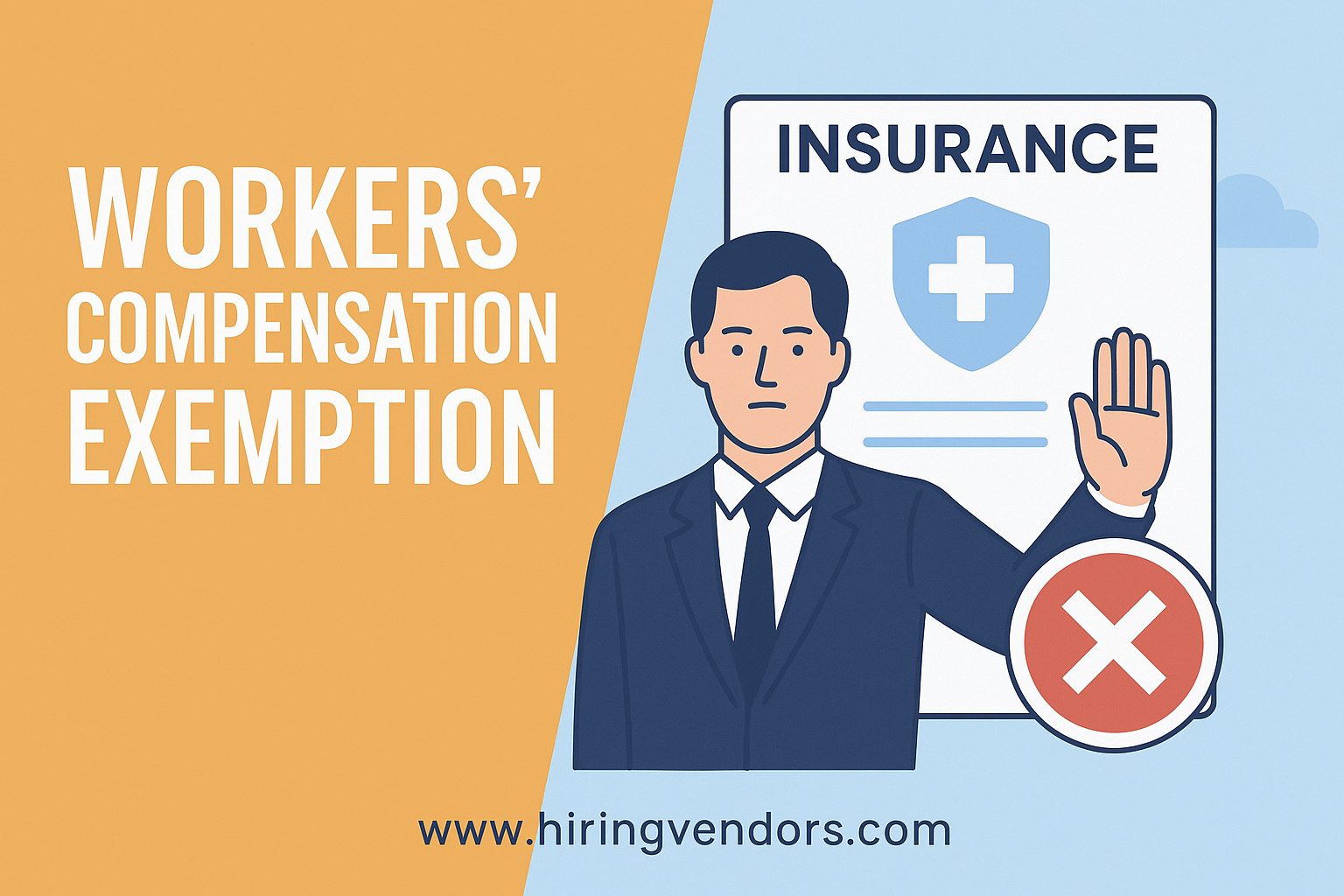
How to Get Workers Compensation Insurance: Merits & Demerits Explained
..it’s a critical layer of protection for your employees and your business.
Explore This Article
ToggleWhy Workers' Compensation Insurance Matters
If you operate a small business or run a contracting company in the property preservation industry, securing workers’ compensation insurance isn’t just a legal formality — it’s a critical layer of protection for your employees and your business. From covering medical expenses and lost wages to shielding your company from lawsuits, workers’ comp can be a financial lifesaver.
In this guideline, we’ll explore:
- What workers’ compensation insurance is
- How to get it
- Its key benefits (merits)
- The limitations (demerits) to be aware of
- How platforms like HiringVendors.com support insured vendors
What is Workers’ Compensation Insurance?
Workers’ compensation insurance (also known as workers’ comp) is a policy that provides financial benefits to employees who are injured or become ill while performing their job duties. It covers:
- Medical bills
- Rehabilitation costs
- A portion of lost wages
- Disability benefits
- Death benefits (in tragic cases)
In exchange, employees usually waive the right to sue the employer for negligence. This mutually beneficial arrangement protects both the business and its workforce.
The idea behind workers’ compensation dates back over a century, with the goal of providing no-fault protection for workers while limiting the employer’s legal exposure. This policy is especially important for businesses in high-risk fields like property preservation, construction, and field services.
Is Workers’ Comp Mandatory?
In most U.S. states, yes. If you have employees (even part-time or temporary), you’re likely required by state law to carry workers’ compensation insurance. The exact requirements vary by:
- State
- Number of employees
- Type of work performed
Some states like Texas allow certain businesses to opt out, while others like California enforce strict compliance. It’s essential to research the rules specific to your state before hiring your first employee.
Failing to carry required coverage can result in severe penalties, including:
- Fines ranging from hundreds to thousands of dollars
- Criminal charges
- Business license suspension
- Stop-work orders
Moreover, if an employee gets injured and you’re uninsured, you could be held personally liable for medical costs and legal damages.
How to Get Workers’ Compensation Insurance
The process of getting covered is relatively simple, but there are a few steps you should follow:
- Determine Your Legal Requirements
- Check your state’s department of labor or workers’ compensation board website.
- Make note of coverage requirements based on your number of employees and industry.
- Gather Business Information
- Business name and EIN
- Number of employees
- Annual payroll estimate
- Job classifications (based on risk level)
- Claims history (if applicable)
- Compare Insurance Providers
- Use licensed agents, brokers, or online platforms like NEXT Insurance, Hiscox, or The Hartford.
- Compare coverage, rates, and customer reviews.
- Purchase a Policy and Keep it Updated
- Pay your premium and receive a Certificate of Insurance (COI).
- Update your insurer about changes in staff size, services, or business location.
- Post Required Notices
- Most states require you to post a workers’ comp compliance notice where employees can see it.
- Keep records of coverage in case of an audit or inspection.
Merits of Workers’ Compensation Insurance
There are many compelling reasons to invest in workers’ comp insurance beyond simply following the law:
- Legal Protection
- Avoid costly lawsuits by providing guaranteed benefits.
- Shields your business from negligence claims.
- Employee Trust and Retention
- Shows workers that you value their safety.
- Boosts morale, loyalty, and employee satisfaction.
- Financial Security
- Prevents large out-of-pocket expenses for injury-related medical care.
- Helps businesses stay afloat during unexpected staff injuries.
- Compliance with Contracts
- Many B2B clients (banks, real estate firms) require proof of workers’ comp.
- Helps you qualify for larger and more profitable jobs.
- Peace of Mind
- Reduces stress knowing you’re protected against worst-case scenarios.
- Encourages safer workplace practices and risk management.
- Reduced Turnover Costs
- Injured workers receive care and often return to work faster.
- Avoids high replacement and training costs.
Demerits of Workers’ Compensation Insurance
Like all insurance policies, workers’ comp isn’t perfect. Here are a few potential downsides:
- Cost
- Premiums can be high for labor-intensive industries like property preservation.
- Rates depend on payroll size, job risk levels, and past claims.
- Fraud Risk
- Some employees may exaggerate or fake injuries to claim benefits.
- Businesses may need to hire investigators or risk managers.
- Administrative Burden
- Filing and managing claims adds paperwork and requires HR oversight.
- Reporting requirements vary by state, increasing complexity for multi-state employers.
- Coverage Limitations
- Does not typically cover independent contractors or volunteers.
- May exclude injuries caused by intoxication, horseplay, or off-duty conduct.
- Complex Classification Codes
- Misclassifying employees can result in under- or overpaying premiums.
- May trigger audits and adjustments.
- Rate Increases After Claims
- Just one claim can cause premiums to spike.
- Managing safety and return-to-work plans is key to controlling costs.
How Much Does Workers’ Compensation Insurance Cost?
Premiums are typically calculated using this formula:
(Payroll / 100) x Job Classification Rate x Experience Modifier
For example:
- Payroll: $100,000
- Rate: $2.00 (for moderate-risk work)
- Modifier: 1.0 (no past claims)
Estimated Premium = ($100,000 / 100) x $2.00 x 1.0 = $2,000/year
Premiums can range from $0.75 to $5.00 per $100 in payroll depending on the industry. High-risk jobs like roofing or demolition will always cost more than lower-risk administrative roles.
Tips to Reduce Workers’ Comp Costs
- Implement a Safety Program: Reduce claims by training employees.
- Return-to-Work Policy: Bring employees back on light duty faster.
- Correct Classifications: Double-check job roles with your insurer.
- Choose a Reputable Carrier: One who helps with claims management.
- Review Annually: Adjust payroll and coverage to avoid overpaying.
How HiringVendors.com Supports Insured Contractors
If you’re a vendor or contractor in the property preservation industry, HiringVendors.com helps you stand out:
- Insurance Badge: Add proof of workers’ comp to your profile to build trust.
- Priority in Search Results: Insured vendors are shown first to job posters.
- Education Center: Access free guides like this to make smart business decisions.
- Direct Job Matches: Many job listings require insured vendors only.
- Marketing Edge: Show clients that you’re legitimate, insured, and ready to work.
Being insured isn’t just about compliance — it’s a competitive edge that separates top contractors from the rest.
Protecting Your Business and Your Team
Workers’ compensation insurance is one of the most important policies a business owner can carry. While it comes with some costs and paperwork, its advantages far outweigh the drawbacks. From legal protection and employee retention to contract compliance and peace of mind, it’s an investment in long-term sustainability.
By understanding how to obtain workers’ comp, what it covers, and how it benefits your team, you’re setting your business up for success.
Need help growing your insured vendor business? Join HiringVendors.com and connect with serious clients looking for reliable, insured contractors across the U.S.
Start strong. Stay protected. Build with confidence.










![Looking for CONTRACTORS in Texas [Commercial, Residential & Property Preservation]](https://hiringvendors.com/wp-content/uploads/2025/06/workers-repair-asphalt-banner-100x100.png)

